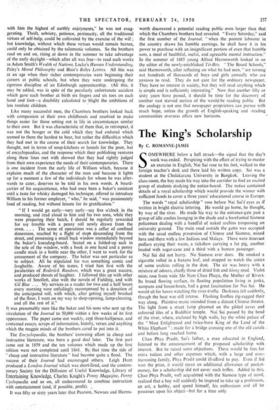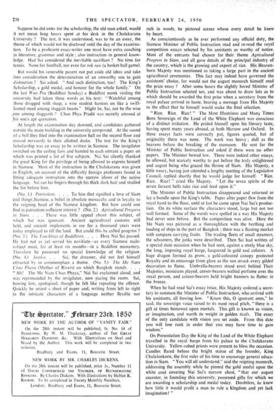The King's Scholarship
By C. ROMANNE-JAMES .
SOMEWHERE below a bell struck—the signal that the day's work was ended. Perspiring with the effort of trying to master an exercise in English, Nai Sai rose to his feet, walked to the foreign teacher's desk and there laid his written copy. Sai was a student at the Chulakarana University in Bangkok. Leaving the class-room, the boy made his way into the corridor to find an excited group of students studying the notice-board. The notice contained details of a royal scholarship which would provide the winner with sufficient funds to cover a three years' educational course in Europe.
The words "royal scholarship" rose before Nai Sai'? eyes as if written in bright electric lettering. He would go home, he thought, by way of the river. He made his way to the entrance-gate past a group of idle coolies lounging in the shade and a barefooted Siamese policeman dealing with a handful of naked urchins trespassing on university ground. The main road outside the gates was occupied with the usual endless procession of Chinese and Siamese, mixed here and there with a few Indians and Malays. There were itinerant pedlars crying their wares, a rickshaw carrying a fat pig, another loaded with sugar-cane and a third with a human passenger.
Nai Sai did not hurry. No Siamese ever does. He smoked a cigarette rolled in a banana 'leaf, and stopped to watch the antics of some urchins rolling in the dust. The air Was heavy with a mixture of odours, chiefly those of dried fish and klong mud. Violet mists rose from wide Me Nam Chao Phaya, the Mother of Rivers. Its broad flowing surface, its floating population living in junks, sampans and house-boats, had a great fascination for Nai Sai. Ha would sit for hours watching the river-traffic. Darkness fell suddenly, though the heat was still intense. Flashing fireflies zig-zagged their way along. Plaintive music sounded from a distant Chinese theatre. The light from a street lamp gleamed on the gilded eaves and coloured tiles of a Buddhist temple. Nai Sai paused by the bend of the river, where, enclosed by high walls, lay the white palace of the "Most Enlightened and twice-born King of the Land of the White Elephant " ; made for a bridge crossing one of the old canals ,. and before long reached home.
Chao Phya Pradit, Sai's father, a man educated in England, listened to the announcement of the proposed scholarship with interest. But he raised some objections. There would be fees for extra tuition and other expenses which; with a large and ever- increasing family, Phya Pradit could ill-afford to pay. Even if Sai won the prize, it would mean an additional allowance of pocket- money, for a scholarship did not cover such trifles. Added to this, Chao Phya Pradit, well acquainted with the Siamese type of mind, realised that a boy will suddenly be inspired to take up a profession, an art, a hobby, and spend himself, his enthusiasm and all he possesses upon his object—but for a time only.
Suppose he did enter for the scholarship, the old man asked, would It not mean long hours spent at his desk in the Chulakarana University ? The test, it was understood, was to be an essay, the theme of which would not be disclosed until the day of the examina- tion. To be a proficient essay-writer one must have extra coaching in literature, grammar and style ; also instruction in general know- ledge. Had Sai considered the inevitable sacrifices ? No time for tennis. None for football, nor even for tok raw (a basket-ball game).
But would his venerable parent not put aside old ideas and take .Into consideration the determination of an unworthy son to gain 6istinction ? Sai asked. "And such distinction, too! The King's Scholarship, a gold medal, and honour for the whole family." On the last Wan Pra (Buddhist Sunday) a Buddhist monk visiting the university had taken these words as his text: "Watchful among those drugged with sleep, a wise student hastens on like a swift- footed steed among sluggish beasts." Might he, Sai, not be the wise .one among sluggards ? Chao Phya Pradit was secretly amused at his son's apt quotation.
At length the examination day dawned, and candidates gathered outside the main building in the university compound. At the sound of a bell they filed into the examination hall on the second floor and moved nervously to their allotted desks. The test for the King's Scholarship was an essay to be written in Siamese. The invigilator switched on the ceiling fans and handed to each entrant a paper on which was printed a list of five subjects. Nai Sai silently thanked the great King for the privilege of being allowed to express himself in Siamese. Most of the instruction in the Chulakarana was given in English, on account of the difficulty foreign professors found in fitting adequate instruction into the narrow idiom of the native language. Sai ran his fingers through his thick dark hair and studied the list before him.
(No. 1.) Patriotism. . . . To him that signified a love of Siam and things .Siamese, a belief in absolute monarchy and in loyalty to the reigning head of the Siamese kingdom. But how could one find in patriotism sufficient interest ? (No. 2.) Agricultural Progress in Siam. . . . There was little appeal about this subject, of which Sai was ignorant. Ancient agricultural customs still held, and ancient implements in use for a thousand years were today employed to till the land. But could this be called progress ? (No. 3.) The Teachings of Buddhism. . . . Here Nai Sai paused. He had not as yet served his novitiate—as every Siamese male- subject must, for at least six months—in a Buddhist monastery. Therefore he possessed no special knowledge of the religion.
(No. 4.) Justice. . . Sai, the dreamer, did not feel himself attracted by so commonplace a theme. (No. 5.) The Me Nam Chao Phaya (Mother of Rivers) on which Bangkok stands. . . " Ah! The Me Nam Chao Phaya," Nai Sai exclaimed aloud, and was reprimanded by the invigilator, now pacing the room. Sai, bowing low, apologised, though he felt like repeating the offence. Quickly he seized a sheet of paper and, writing from left to right in the intricate characters of a language neither flexible nor rich in words, he pictured scenes whose every detail he knew by heart.
As conscientiously as he ever performed any official duty, the Siamese Minister of Public Instruction read and re-read the royal competition essays selected by his assistants as worthy of notice. Most of the entrants had chosen for their theme Agricultural Progress in Siam, and all gave details of the principal industry of the country, which- is the growing and export of rice. His Heaven- born Majesty was mentioned as taking a large part in the ancient agricultural ceremonies. This fact may indeed have governed the assistants' choice, for would not the august monarch himself read the prize essay ? After some hours the slightly bored Minister of Public Instruction selected ten, and was about to draw lots as to which should be awarded the first prize when a secretary from the royal palace arrived in haste, bearing a message from His Majesty to the effect that he himself would make the final selection.
" Rice. Rice. Rice! " The Most Illustrious and Many Times Born Sovereign of the Land of the White Elephant was conscious of a distinct irritation. He prided himself upon his literary taste, having spent many years abroad, at both Harrow and Oxford. In these essays facts were correctly put, figures quoted, but of originality there was none. The work was heavy ; dull as the heavens before the breaking of the monsoon. He sent for the Minister of Public Instruction and asked if there were no other papers. The Minister bowed low. There were indeed other essays, he allowed, but scarcely worthy to put before the truly enlightened and august being who graced the throne of Siam. His Majesty, a little weary, having just attended a lengthy meeting of the Legislative Council, replied shortly that he would judge for himself. "Rice. Rice. Rice! " cried His Majesty. "Let the seven spirits of the seven fiercest hells take rice and feed upon it." • The Minister of Public Instruction disappeared and returned to lay a bundle upon the King's table. Paper after paper flew from the royal hand to the floor, until at last he came upon Nai Sai's produc- tion. On its white surface the characters stood, large but not too well formed. Some of the words were spelled in a way His Majesty had never seen before. But the composition was alive. Here the Me Nam was pictured as a thoroughfare with the berthing and loading of ships in the port of Bangkok ; there was a floating market with sampans carrying fruits. The trading fleets of small steamers, the schooners, the junks were described. Then Sai had written of a special state occasion when he had seen, against a steely blue sky, the long, imposing royal barge, lacquered in gold and colours. A huge dragon formed its prow, a gold-coloured canopy protected Royalty and its entourage from glare as the sun struck every gilded decoration to flame. Umbrella-bearers stood erect behind Their Majesties, musicians played, censer-bearers wafted perfume over the royal person, and colour-bearers held, bright banners to flutter in the breeze.
When he had read Sai's essay twice, His Majesty ordered a secre- tary to summon the Minister of Public Instruction, who arrived with his assistants, all bowing low. "Know this, 0 ignorant ones," he said, the sovereign voice raised to its most royal pitch, "there is a gift at times bestowed upon mortals. This gift is known as vision, or imagination, and worth its weight in golden ticals. The essay of the only candidate with vision you set aside. From this date you will lose rank in order that you may have time to gain wisdom."
On Presentation Day the King of the Land of the White Elephant travelled in the royal barge from, his palace to the Chulakarana University. Yellow-robed priests were present to bless the occasion. Candles flared before the bright statue of the founder, King Chulalonkorn, the first ruler of his time to encourage general educa- tion in Siam. "You will all understand," said the reigning monarch, addressing the assembly while he pinned the gold medal upon the white coat covering Nai Saes narrow chest, "that our august ancestar, in founding this university, possessed gifts for which we are awarding a scholarship and medal today. Doubtless, he knew how little it would profit a man to rule a kingdom and yet lack imagination!"



































 Previous page
Previous page